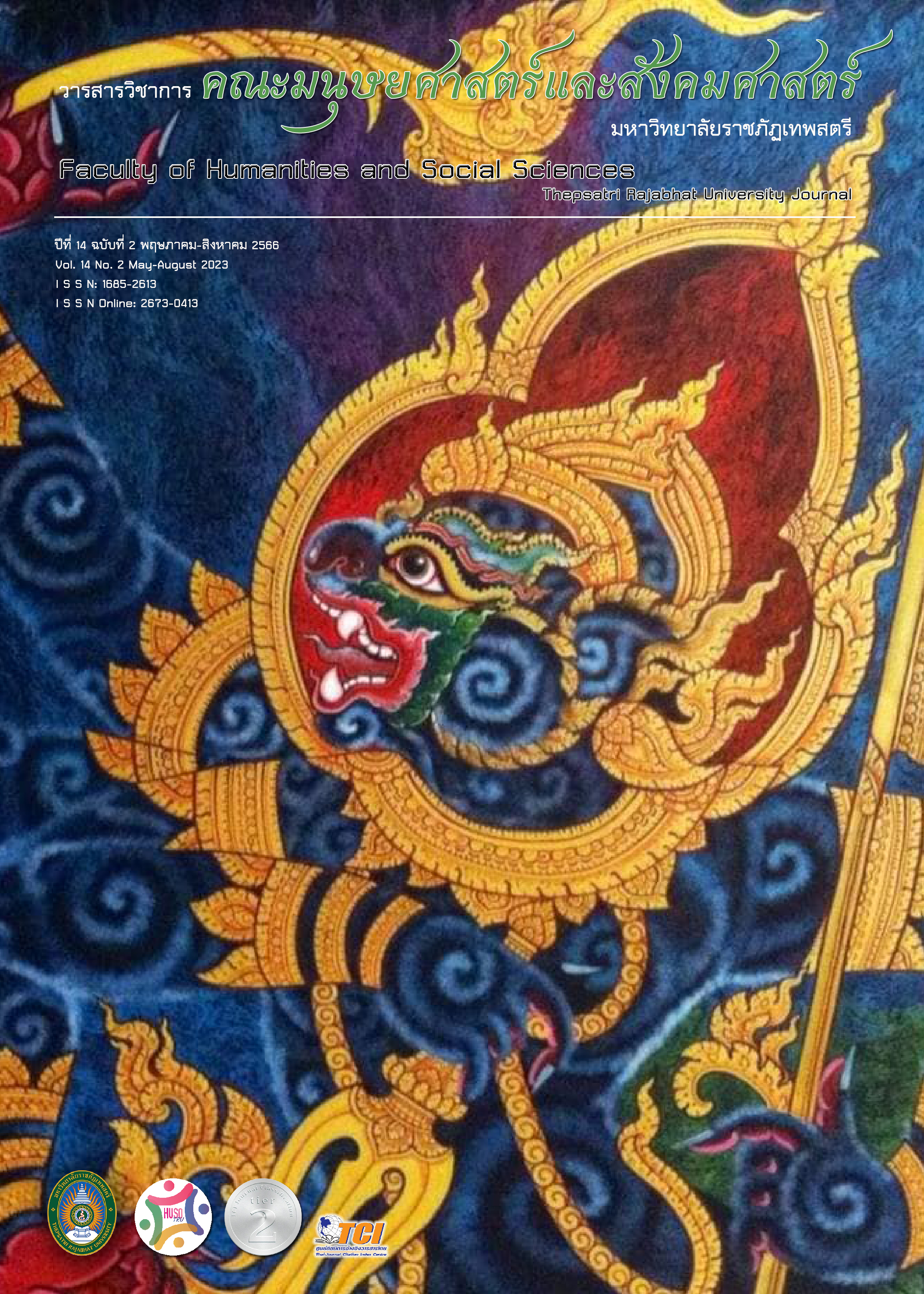Instruction for Developing Soft Skills of Generation Z Students in Higher Education to be Ready for Enterprise
Main Article Content
Abstract
Generation Z represents people born between 1995 – 2009, aged between 13-23 years old. Characteristics of the learners in this group are the ability to remember images (visual memory), bound to use the media, able to access information. Therefore, this group of learners is smart and they can do several different jobs at the same time. They have quite high flexibility, dare to think, dare to do but this group of learners has low patience, easy to be manipulated, lack analytical thinking and they don’t want to be a of argument or competition. These characteristics deprive them of creativity also leadership, lack of communication skills, social skills and emotional intelligence (EQ) decreased, which are Soft Skills that entrepreneurs need. To provide instruction for Generation Z to develop Soft Skills, it must be adjusted from policy level, institution, curriculum, subject, instructors, as well as the learners themselves. Active-learning is one of educational strategy, within which many other Activity-Based Learning, Experiential Learning, Problem-Based Learning and Project-Based Learning reside. These instructions are learner-centered. Learners participate in learning activity plans. It is a form of learning by doing and it allows learners to apply their knowledge. These instructions include interaction between learners, classmates and teachers. Active-learning encourages learners to create a thought process, advanced analysis to the development of Soft Skills that entrepreneurs need, such as Communication Skills, Critical Thinking Skills, Problem Solving Skills, Creativity, and Interpersonal Skills.
Downloads
Article Details

This work is licensed under a Creative Commons Attribution-NonCommercial-NoDerivatives 4.0 International License.
The content and information presented in articles published in the Academic Journal of the Faculty of Humanities and Social Sciences, Thepsatri Rajabhat University, are solely the opinions and responsibilities of the respective authors. The editorial board of the journal neither necessarily agrees with nor assumes any responsibility for such content in any manner whatsoever.
All articles, information, content, and images published in the Academic Journal of the Faculty of Humanities and Social Sciences, Thepsatri Rajabhat University, are the copyright of the journal. Any person or organization wishing to reproduce, disseminate, or otherwise utilize all or any part thereof must obtain prior permission from the Academic Journal of the Faculty of Humanities and Social Sciences, Thepsatri Rajabhat University.
References
ชนสิทธิ์ สิทธิ์สูงเนิน, และเอกสิทธิ์ ชนินทรภูมิ. (2564, พฤษภาคม - สิงหาคม). การพัฒนากิจกรรมการเรียนการสอนโดยใช้กิจกรรมเป็นฐานเพื่อส่งเสริมความสามารถ ในการออกแบบการจัดจิกรรมการเรียนรู้อย่างสร้างสรรค์ของนักศึกษาครู คณะศึกษาศาสตร์มหาวิทยาลัยศิลปากร. วารสารวิชาการมหาวิทยาลัยราชภัฏเพชรบุรี, 11(2), 38 – 48.
ชัชวาล วงค์สารี. (2562, มกราคม - เมษายน). การสอนการคิดให้มีวิจารณญาณในนักศึกษาพยาบาล Generation Z: การทบทวนวรรณกรรม. วารสารพยาบาลทหารบก, 20(1), 21 - 30.
ชโลทร โชติกีรติเวช, และวัลลภา อารีรัตน์. (2560, มกราคม - เมษายน). ความต้องการจำเป็นในการพัฒนาทักษะ Soft Skills เพื่อการจัดการเรียนรู้ของครูในสถานศึกษาสังกัดสำนักงานเขตพื้นที่การศึกษามัธยมศึกษา เขต 25. วารสารวิจัย มข.(ฉบับบัณฑิตศึกษา) สาขามนุษยศาสตร์และสังคมศาสตร์, 5(1), 44 – 52.
ณิรดา เวชญาลักษณ์. (2562). หลักการจัดการเรียนรู้. กรุงเทพฯ: สำนักพิมพ์จุฬาลงกรณ์มหาวิทยาลัย.
บุษกร วัฒนบุตร. (2563, มกราคม - มีนาคม). ปัจจัยที่มีอิทธิพลต่อการพัฒนา Soft Skills ของเยาวชนไทยในศตวรรษที่ 21. วารสารวิจัยวิชาการ, 4(1), 87 - 94.
บุหงา ชัยสุวรรณ, พรรณพิลาศ กุลดิลก, และชัชญา สกุณา. (2565, มกราคม - เมษายน). สถานการณ์ แนวโน้ม และความต้องการความรู้และทักษะปัญญาประดิษฐ์ทางการสื่อสารเพื่อเพิ่มประสิทธิภาพการทำงานของบุคลากรวัยทำงานในประเทศไทย. วารสารวิชาการมนุษยศาสตร์และสังคมศาสตร์ มหาวิทยาลัยบูรพา, 30(1), 110 - 134.
ปิยวรรณ สูนาสวน, มนัญญา มานะรัชศักดิ์, ถิรนันท์ ปานศุภวัชร, ชนสิทธิ์ สิทธิ์สูงเนิน, และมาเรียม นิลพันธุ์. (2564, มกราคม – มิถุนายน). การศึกษาแนวทางการบริหารจัดการหลักสูตรเพื่อส่งเสริมศักยภาพรายบุคคลในศตวรรษที่ 21 กรณีศึกษาโรงเรียนสาธิตสังกัดมหาวิทยาลัยระดับมัธยมศึกษา. วารสารวิจัยและพัฒนาหลักสูตร, 11(1), 36 – 48.
ภริมา วินิธาสถิตกุล, และชนินันท์ แย้มขวัญเมือง. (2565, กันยายน - ธันวาคม). การเรียนรู้เชิงรุก: แนวทางการเรียนการสอนที่เป็นเลิศในศตวรรษที่ 21. วารสารนวัตกรรมการศึกษาและการวิจัย, 6(3), 921 – 933.
มนตรี อินตา. (2562, มกราคม - มิถุนายน). Soft Skills: ทักษะที่จำเป็นสู่ความเป็นมืออาชีพของครูยุคใหม่. วารสารวิชาการศึกษาศาสตร์ ศรีนครินทรวิโรฒ, 20(1), 153 – 167.
มหาวิทยาลัยอุบลราชธานี. (ม.ป.ป.). การจัดการเรียนการสอนโดยใช้ปัญหาเป็นฐาน (Project Based Learning: PBL). สืบค้น สิงหาคม 15, 2565, จาก https://www.ubu.ac.th/web/files_up/43f2017010522270295.pdf.
รัตนวัชร์ เพ็ญรัตนหิรัญ, และก่องทรัพย์ ทองคำ. (2564, มกราคม - เมษายน). การสำรวจ Soft Skills ที่จำเป็นของสถานประกอบการในศตวรรษที่ 21. วารสารวิจัยรำไพพรรณี, 15(1), 59 - 69.
รัตนา กลิ่นจุ้ย, และวาสนา จักรแก้ว. (2563, เมษายน - มิถุนายน). การจัดการเรียนรู้วิชาภาษาอังกฤษเพื่อทักษะการเรียนกับการเรียนรู้แบบลงมือปฏิบัติ สำหรับผู้เรียนกลุ่มเจเนอเรชัน Z. วารสารศึกษาศาสตร์ มหาวิทยาลัยนเรศวร, 22(4), 199 – 214.
ศูนย์วิจัยกสิกรไทย. (2564). “Gen Z” First Jobber รุ่นใหม่ เพื่อเข้าใจ "ความต่าง". สืบค้น สิงหาคม 12, 2565, จาก https://www.kasikornresearch.com/th/analysis/k-social-media/Pages/Gen-Z-11-08-21.aspx.
สิรีวัฒน์ อายุวัฒน์. (2560, พฤษภาคม – สิงหาคม). การเรียนการสอนโดยใช้ปัญหาเป็นหลัก (Problem - Based Learning): ความท้าทายของการศึกษาพยาบาลในการพัฒนาการเรียนรู้ในศตวรรษที่ 21. วารสารพยาบาลกระทรวงสาธารณสุข, 27(2), 20 – 21.
สำนักงานราชบัณฑิตยสภา. (2557). จรณทักษะ. สืบค้น สิงหาคม 14, 2565, จาก http://legacy.orst.go.th/?knowledges.
อรุณฉัตร คุรุวาณิชย์, และชนันญา น้อยสันเทียะ. (ม.ป.ป.). ทฤษฎีการเรียนรู้จากประสบการณ์หรือ Experiential Learning Theory (ELT). สืบค้น สิงหาคม 16, 2565, จาก https://www.lifeeducation.in.th/positive-education/.
Cickovska, E. (2020, December). Understanding and Teaching Gen Z in Higher Education. Horizons - International Scientific Journal (Series A), 26(3), 275 - 290.
Felder, R. M., & Brent, R. (1996, April). Navigating The Bumpy Road to Student - Centered Instruction. College Teaching, 44(2), 43 - 47.
Majid, S., Liming, Z., Tong, S., & Raihana, S. (2012, December). Importance of Soft Skills for Education and Career Success. International Journal for Cross-Disciplinary Subjects in Education (IJCDSE), 2(2), 1036 - 1042.
Mamidenna, S. (2009, March). Use of Portfolios in a Soft Skills Course. The Icfai University Journal of Soft Skills, 3(1), 7 - 17.
Mosca, J. B., Curtis, K. P., & Savoth, P. G. (2019, September). New Approaches to Learning for Generation Z. Journal of Business Diversity, 19(3), 66 – 74.
Vasanthakumari S. (2019, September). Soft Skills and Its Application in Work Place. World Journal of Advanced Research and Reviews, 3(2), 66 – 72.
WikiJob Team. (2022). 20 Soft Skills Employers Look For in 2023 (With Examples). Retrieved August 12, 2022, from https://www.wikijob.co.uk/interview-advice/competencies/soft-skills.
Zhang, A. (2012, January). Peer Assessment of Soft Skills and Hard Skills. Journal of Information Technology Education, 11(1), 155 – 168.


